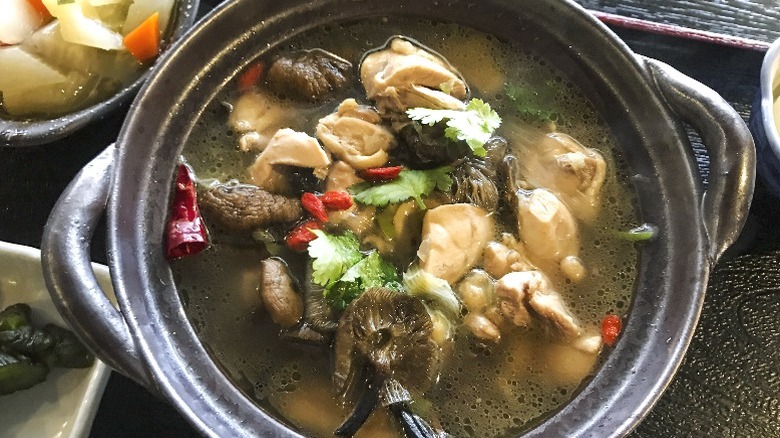You've Probably Been Cooking Soup Wrong, But There's An Easy Fix
Just because something makes logical sense doesn't mean it's true. It's easy to understand why earlier civilizations watched the Sun move through the sky and assumed it revolved around Earth, but that doesn't make them any less wrong. Likewise, the idea that you can get good soup quicker by cooking it at a higher temperature than the recipe calls for makes a certain amount of sense. If it takes an hour to make a soup at a simmer, surely you could get it in half an hour if you boil it, right? Well, not quite. In fact, boiling your soup is a big mistake.
Soup is a dish that thrives when cooked low and slow; this is why you'll find so many cookbooks have soup recipes for slow cookers. A gentle simmer is all that's needed to make a delicious soup, even if it takes the better part of an afternoon to finish. If you bring the soup to a boil and leave it there for a significant length of time, it will cook far too quickly and aggressively, resulting in mushy, flavorless vegetables and dry, chalky meat. Hardly the stuff autumnal dreams are made of.
How do you maintain a simmering soup?
A simmer is the perfect temperature for cooking soup. Not only does it let that wonderful smell permeate your house, but it also cooks slowly and gently so that your veggies and meat don't fall apart in the pot. Not only that, it keeps liquid from reducing too quickly, ensuring that your soup isn't just solids floating in a quarter-inch of broth. But how do you know when your pot is at that perfect simmer?
Roughly speaking, a simmer occurs when a liquid is heated to between 185 and 205 degrees Fahrenheit. That means it's not quite at a full boil, but bubbles are still coming to the surface. A bare simmer is when the liquid is mostly motionless, but a few bubbles still come up; a full simmer is when it's bubbling vigorously but not at a full, rolling boil. Exactly what kind of simmer you want will be specified in your recipe, but in any case, it's much better for your soup than boiling. So whether you're enjoying one of these winter soup recipes or this fine split pea recipe, keep this in mind.

